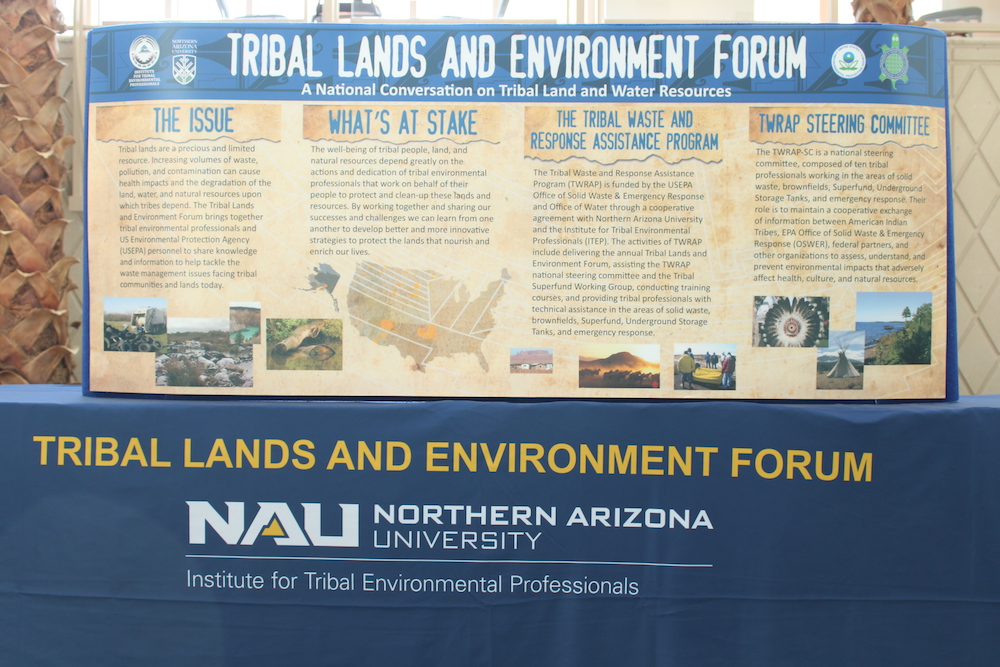
- Details
- By Darren Thompson
MILWAUKEE—The Tribal Lands and Environment Forum convened its eleventh annual forum today at the Wisconsin Center in downtown Milwaukee. The annual event is organized largely by the Flagstaff, Ariz.-based Institute for Tribal Environmental Professionals (ITEP) at Northern Arizona University, the Tribal Waste and Response Steering Committee, and the US EPA’s Office of Land and Emergency Management.
Usually, the conference has a theme to the annual event, but organizers said this year’s agenda was so diverse that it was difficult to focus on one theme. However, the agenda of the conference is largely funded and influenced by the EPA’s Office of Land and Emergency Management, according to said ITEP Director Mehrdad Khatabi to Native News Online.
“Funding largely comes from the EPA’s Office of Land and Emergency Management—it drives the agenda,” ITEP Director Mehrdad Khatabi told Native News Online. “Tribal professionals and representatives from various environmental organizations, including the US EPA, come to share ideas of how they are dealing with waste and resources on tribal lands.”
More than 400 professionals from various Tribal Nations, nonprofit organizations, and other federal and state agencies convened in Milwaukee to a robust agenda. Discussions on Superfund sites, the EPA’s Brownfield program, environmental justice, solid waste management, and what the Biden Administration is doing to comply with Indian Treaty Rights were some of the discussions highlighted in the agenda.
The COVID-19 pandemic and its effect on the Navajo Nation was highlighted. Vivian Craig, of the Navajo Nation’s Environmental Protection Agency (NEPA), said in her presentation that many waste removal projects were delayed because of how much the pandemic affected the tribe. The US EPA was not allowed on the reservation during the pandemic because of the restrictions the Navajo Nation created to curb the pandemic. Some NEPA employees helped distribute water and supplies to citizens of the tribe and stopped fieldwork.
“We couldn’t go anywhere, or drive anywhere in the evening,” Navajo Nation Senior Environmental Specialist Vivian Craig said in her presentation on Tuesday afternoon. “Every weekend was eery and quiet due to weekend curfews and travel restrictions.”
“The Navajo Nation will be feeling the effects of the pandemic for years to come,” she said.
In April, Native News Online reported that the United States Regulatory Commission (NRC) traveled to the Navajo Nation to hear of the impacts of uranium mining on the Navajo Nation. It was the first time the agency visited the Navajo Nation, which has more than 500 abandoned uranium mines within the reservation.
The forum featured training sessions, meetings, discussion circles, field trips, and networking opportunities for Tribes working on contaminated sites. The forum’s sponsors included the American Society of Reclamation Services, National Indian Carbon Coalition, Gold Systems, and Kansas State University’s Tribal Tab Program.
More Stories Like This
Gwich'in Tribal Governments Submit Comments Challenging Fish and Wildlife Service's Inadequate Environmental Review of Arctic Refuge Snow RoadRappahannock Tribe Challenges 9M-Gallon Water Plan
Feds release draft long-term plans for Colorado River management
Apache Leader Walks 60 Miles to Court Hearing That Will Decide Fate of Sacred Oak Flat
Rappahannock Tribe Raises Sovereignty and Environmental Concerns Over Caroline County Water Permit
Help us defend tribal sovereignty.
At Native News Online, our mission is rooted in telling the stories that strengthen sovereignty and uplift Indigenous voices — not just at year’s end, but every single day.
Because of your generosity last year, we were able to keep our reporters on the ground in tribal communities, at national gatherings and in the halls of Congress — covering the issues that matter most to Indian Country: sovereignty, culture, education, health and economic opportunity.
That support sustained us through a tough year in 2025. Now, as we look to the year ahead, we need your help right now to ensure warrior journalism remains strong — reporting that defends tribal sovereignty, amplifies Native truth, and holds power accountable.
 The stakes couldn't be higher. Your support keeps Native voices heard, Native stories told and Native sovereignty defended.
The stakes couldn't be higher. Your support keeps Native voices heard, Native stories told and Native sovereignty defended.
Stand with Warrior Journalism today.
Levi Rickert (Potawatomi), Editor & Publisher
